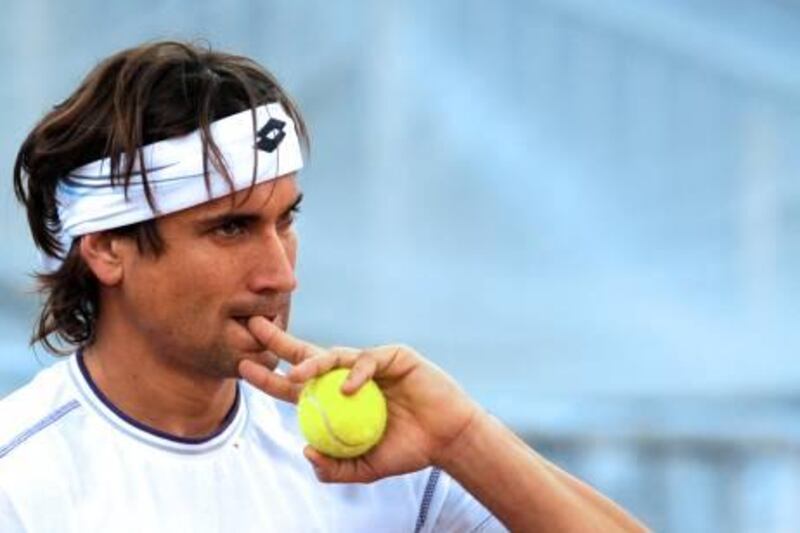Sportsmen rarely double as intellectuals. Developing the body often seems to come at the expense of improving the mind.
In American baseball, any player seen reading a newspaper is likely to be dubbed "Doc". If the reading material is a book, "Professor" likely will be attached to him.
Footballers worldwide seem to revel in their ignorance of life beyond the pitch. In France, the saying goes: "Big legs; little brains".
David Ferrer, then, is a rara avis. The world's No 5-ranked tennis player is a thinking man in a milieu where reaction times, brute strength and hand-eye coordination count for far more than an athlete's reading list.
The Spaniard is back in Abu Dhabi this week for the Mubadala World Tennis Championship.
He plays Jo-Wilfried Tsonga in a 3pm match today, with the winner advancing to meet Rafael Nadal tomorrow.
[ The line-up at the Zayed Sports City ]
He may even have time to get deeper into his current book, Yo Mato ("I Kill"), by the Italian, Giorgio Faletti, or to revisit his favourite author, the Spaniard, Arturo Perez-Reverte, whose book La Reina del Sul (Queen of the South) is ranked No 1 in Ferrer's personal library.
"I read always as a child," Ferrer said in English. "My mother, she is a teacher, and I was always given a book to read. In the clubhouse, we have a lot of free time and reading is my hobby."
He believes that stretching the mind should have a higher priority than sports pursuits.
"I think it's important, very important, for everything," he said. "The culture is more important than the racket or baseball or football. We have a chance to travel and visit many cities, and it is good to know something about them.
"I think it is more important to be a thinker than a sportsman. Sports is only a job. My job is to play tennis, but I prefer to make a good thinker than to be better as a sportsman."
Ferrer, 29, is known for steadfast self-deprecation.
Not only is he careful not to make claims to special intelligence, throughout his career he has publicly doubted that he can climb in the rankings any higher than he happens to be at that moment, going back to when he was outside the top 50, and reportedly said he could not imagine getting inside.
At present, he expresses doubts about his ability to crack the top four of Novak Djokovic, Rafael Nadal, Roger Federer and Andy Murray.
"I'm very happy with my ranking," he said. "I think last season was the best of my career; I played more consistent and regular, and I did my best. In 2007, I was [ranked] No 4 and in this year I am No 5, but I think I am a better player now than when I was No 4.
"I was happy to come back to the top 10. It is difficult to get into the top four in this moment."
He won twice during the 2011 season, at Auckland in January and in Acapulco in February. He reached four other finals, but ran into Nadal in two of them, on consecutive Sundays in April.
Ferrer's approach to the game is equal parts of strategy and sheer determination.
He is neither as tall nor as powerful as the Big Four. That he excels on clay is no surprise; grinding out long rallies where clever shot-making are particularly important on the game's slowest surface.
Six of his 11 ATP championships have come on clay, and 16 of his 25 finals appearances.
Federer once described him as one of the game's best at returning serve, which prompted Ferrer to suggest that Nadal actually deserved that title. Ferrer also has one of the best second serves in the sport.
When pressed, he will concede that the major he would most like to win is the French, which is played on clay.
But his deepest runs in majors were to the semi-finals of the US Open in 2007 and the Australian Open in January of this year.
Ferrer has worked with the same coach, Javier Piles, since he was a teenager, and his manager's mental toughness seems to have seeped into Ferrer's character.
He has never disavowed stories that Piles would lock him in a closet if he did not train hard enough, or that he gave up the game at age 17, but after one week working at a construction site asked Piles to take him back.
A mark of Ferrer's relative anonymity but thorough ferocity, on court, is this: many casual fans know nothing more of his 2011 season beyond the moment.
At the Sony Ericksson Open in Miami, when he lobbed a ball in the direction of a crying baby during a quarter-final loss to Mardy Fish.
"It was in one moment of the match," Ferrer said then. "It was nothing special."
He was booed by fans, but the baby stopped crying.
Said Fish: "He'd probably take that one back, if he could. He's a very nice guy."
And a bright one, as well. Asked to identify other intellectually curious players on tour he said: "I don't know, because I don't know all the players and what they do in their private lives. All I know is what they do on the court."





